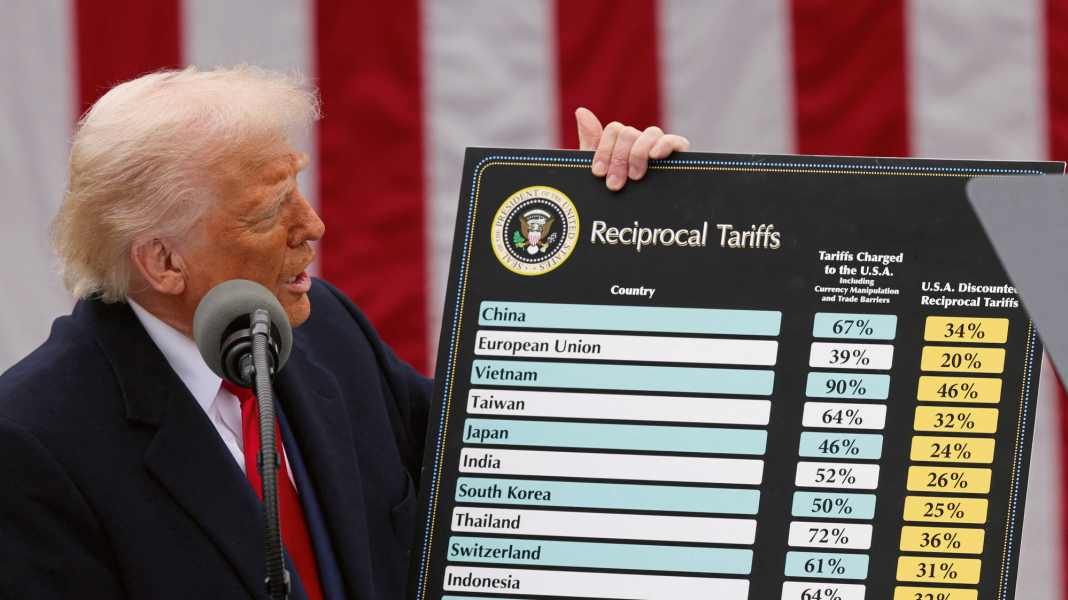
For imports from countries with what the US considers to be "excessive trade barriers", the rate can rise to 20 per cent after 90 days; higher levels are only envisaged for individual countries such as China. The EU has decided on retaliatory tariffs of up to 25 percent, but has suspended them until 14 July 2025 in order to explore a political solution within this period. Whether this succeeds will determine whether the new customs regime remains a disruptive factor for years to come or shrinks to a footnote in the global economy in just a few months.
Tariffs as such are by no means new. There have also often been disputes about tariffs in the past. Nevertheless, the Trump administration's confrontational tariff policy is surprising for global trade - especially the relationship with the EU - and is uncharted territory in terms of its unpredictability. Customs policy as we are currently experiencing it leads to uncertainty with regard to various factors such as price calculations or supply chains. A confrontational and therefore volatile customs policy has a particular impact on longer-term projects.
In the following overview, we would like to show you where yacht owners and the yacht industry are directly feeling the consequences - both for new builds and in the charter business - and what legal options are available to you in this context.
New buildings: Calculating on sight
The order books of large series shipyards reacted promptly to the announcements of significantly higher import duties from the USA. Production at the Swedish family business Hallberg-Rassy is said to have been cut back by a third. It is said that 64 of the 194 jobs will be lost. The Austrian Frauscher shipyard is reporting all US orders as "on hold" until there is clarity about the outcome of the negotiations. German manufacturers such as Bavaria and Hanse Yachts appear more relaxed, citing the fact that North America only accounts for a single-digit percentage of their sales. But even those who do not export are likely to be worried - the economy fears a psychological reluctance to buy in Europe.
In legal terms, customs duties are levied on the cross-border movement of goods. They are aimed at various purposes; in the USA, the protection or reconstruction of the domestic economy and the increase in state revenue are specifically named as reasons. If a country decides to introduce tariffs, counter-tariffs from the affected countries are usually not long in coming. This is exactly what is happening on the world stage right now. Both tariffs, but especially the EU counter-tariffs, are directly noticeable for local (EU) consumers. Many European shipyards install US engine parts, navigation electronics or teak decks. Each of these components may become considerably more expensive when imported into Europe. Currency fluctuations increase these uncertainties and can have a mitigating or exacerbating effect: Customs-related increases are currently easier for European customers to cope with because the euro has gained around six per cent against the dollar since January 2025.
Industry analysts are currently forecasting a five to ten per cent decline in European new build sales in the series yacht segment for 2025 as a whole, while demand in the superyacht segment remains surprisingly robust. There are indeed explanations. One reason could be that buyers in this segment often register their vessels under third-party flags and can therefore avoid the immediate effects of a customs dispute. Overall, however, the industry is alarmed. The European umbrella organisation European Boating Industry is already warning of a "threat to entire value chains" and is warning that the political agreement deadline of July 2025 should be used to avoid a real dispute. Otherwise, what the Hallberg-Rassy shipyard has already experienced on a small scale could threaten on a large scale: A political dispute could turn into real job losses.
Charter market: Customs-driven or just nervous?
In the charter market, it is worth taking a look at the business with smaller, indexed yachts. The popular Mediterranean areas have increased their prices by around six per cent compared to 2024. But do these price increases really have anything to do with customs duties? Apparently, fewer ships built in the USA are already travelling to European destinations. Charter operators who have ordered catamarans from the USA in 2024 are postponing new purchases as long as it is unclear whether import duties of up to 20 per cent will be incurred on subsequent transfers to the USA. Customs disputes could also have a direct impact on the financing costs of charter fleets.
Read also:
The MYBA Charter Show 2025 in Sanremo is sending the opposite signal: with more than 80 superyachts registered - the largest fleet in over a decade - the season is off to a stronger start than ever before. This abundant supply should significantly mitigate the price impact of customs duties and act as a price buffer. There is therefore much to be said for stable tariffs at least until 14 July 2025, but if the upcoming negotiations with the USA fail, further increases are certainly conceivable. These would be directly and undoubtedly attributable to the tariff issue.
It could therefore be advisable to quickly fix charter weeks for the 2025 peak season: Even a surcharge of five per cent makes a charter considerably more expensive during the peak season. If you want to prevent customs issues even further, you could consider flexible delivery and route clauses in charter contracts - this would enable customs-optimised route changes (for example from Croatia to Turkey).
New construction and acquisition: What specifically needs to be considered?
The effects of customs disputes on the new and used yacht market are much more difficult to grasp. Shipyards and manufacturers are naturally affected to a greater extent than owners or prospective buyers, who may simply postpone the yacht transaction. Pricing remains a complex mixed calculation with much more significant consequences than in the charter market. For yachts that are considered too expensive, access to the market becomes much more difficult. From a legal point of view, a distinction must be made between existing contracts, which will deal with ways out of problems that have already been created, and new contracts to be concluded.
Existing contracts are always subject to a case-by-case review. If customs issues take effect and drive up prices, the question arises as to whether contractual or legal remedies exist or have been agreed. German law recognises the so-called "frustration of contract", which - if relevant - requires adjustments to the contract. However, it is questionable whether the customs issue in its current form is suitable to justify such a cancellation. An assessment that could turn out differently in the USA/China relationship. In addition, there is always the possibility that cases of "force majeure" are contractually defined and agreed with mitigating legal consequences. Depending on the nature of the individual case, problems can be solved contractually in this way.
There is more room for manoeuvre in contracts that are currently being negotiated. Every future construction contract should include an escalation clause for customs duties and exchange rates. Such clauses reduce or avoid a dispute if the final price increases due to the measures specified in advance in the clauses by agreeing in advance who is to bear these price effects and to what extent.
They could also consider negotiating payment plans with longer milestone intervals. Shipyards may be willing to talk to you here, especially as every new order brings liquidity in the long term. It is also conceivable to agree with the shipyard on subcontractors/suppliers who are not at risk of having to pass on customs-related price increases to customers. Regular reviews and the possibility of adjusting the agreement should also be established, as additional sanction risks may arise in relation to China in addition to the existing US tariffs.
It is well known that project design pleasure begins with yachts over 24 metres in length, as not only are the interior and layout tailored to the owner, but registration under a third flag (e.g. Cayman Islands or Marshall Islands) can and should also be considered if customs issues are the focus. However, the choice of flag and registration are also worth considering for a variety of other reasons and are often worthwhile. But be careful: such arrangements always require detailed legal and tax advice.
You will see: Once you have circumnavigated the customs cliffs, wonderful yachting experiences await you again this year.
Experts for all questions of yacht law

The yacht lawyers Dr Tim Schommer (tim.schommer@clydeco.com) and Dr Volker Lücke (volker.luecke@clydeco.com) have been advising yacht clients from Germany and abroad for over 18 years. They advise on the planning and construction phase, the purchase and sale, the owner structure, yacht operation including insurance, crewing and charter as well as the handling of damage and third-party claims.

